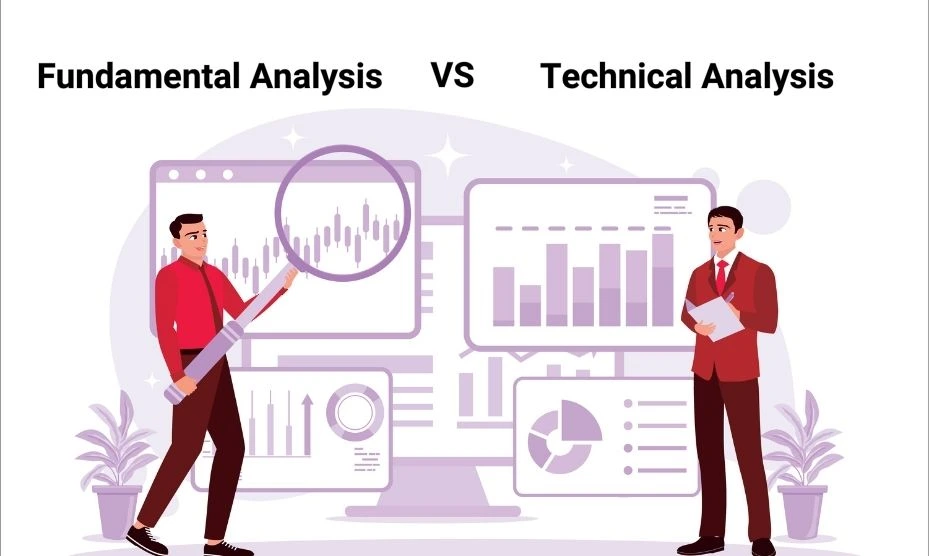
Differences Between Fundamental Analysis and Technical Analysis
Investing in the stock market will require a balance of information, skills, and experience. Market participants must be careful and use analysis and planning to gain profits. Skills that play a role in getting there are fundamental analysis and technical analysis. An understanding of what both entails will be vital to the right outcome.
You may question why knowing the difference between fundamental and technical analysis matters. Selecting the ideal analysis option that matches your goals and puts you closer to your dream future is a must!
This blog helps you, whether you are a trader or investor, reach your profit faster with the preferable research option.
What is Fundamental Analysis?
The fundamental way of studying information focuses on the historical value of a share. This information-gaining process revolves around fiscal health, the industry's past, and other hidden features that can change a company's outcome.
Noting the central parts of this research form is essential when comparing technical analysis versus fundamental analysis:
- • Statements & Documents
- • Market Indicators
- • Industry & Company Analysis
- • Qualitative Elements
Going over income statements, balance sheets, and cash flow reports is a core part of this research type. These pieces of paper clarify where the company stands and how worthy of a chance it is.
Look into inflation and interest rate charts for insight into the economy's state. Various specialised indicators can show when it's not a good time to invest!
People interested in stocks must check the industry, market share, competition, and chance of growth before deciding. It gives people a sixth sense before parting ways with their money.
It dives into the brand, value, and its current market size. All of the above play a role in deciding a share's worth and shouldn't be overlooked.
What Is Technical Analysis?
It's a research method that proves that price changes and trend direction are vital to watch. It comes from the inbuilt belief that price patterns from the past and present help predict where it will go in the future.
Market participants will find these the core elements of this research method:
- • Checking Trading Volumes
- • Technical Indicators
- • Share Price Trends
You can look at trading volumes over time to see the strength of price directions. When volumes are high and prices rise, buying interest is flourishing. When volumes are high amid dropping prices, there is pressure to sell.
Features like the relative strength index or moving averages give a tip-off of where the market is trending and in which direction the momentum is shifting, as information from these leads to better choices for traders to decide.
Looking at the price chart will reveal if the prices are trending upwards or downwards. Seasoned market participants decide based on whether the trend is "bearish" or "bullish".
Looking into the market to see and hear people's thoughts can help traders and investors get ideas of what people feel will happen next, which can influence decisions.

How Do Fundamental Analysis and Technical Analysis Work?
Fundamental analysis and technical analysis work differently but help people make safe and more profitable decisions.
Fundamental research studies surround the whys and whats. It takes a deeper look at qualitative and quantitative information above all else. It relies on a gut feeling that market prices show final value.
The technical approach looks at the hows of the market and its behaviour. It relies on charts, stats, and tools to find the trends. It also assumes the current prices include all information.
Difference Between Fundamental Analysis and Technical Analysis
A detailed comparison between fundamental analysis and technical analysis will help anyone make a better future for themselves by making informed decisions based on clear choices.
| Feature | Fundamental Analysis | Technical Analysis |
|---|---|---|
| Area of Focus | Share intrinsic value | Price trends |
| Ideal For | Long-term investments | Short-term trading |
| Data Source | Financial statements and documentation | Historical data and trading volumes |
| Factors | All factors matter (economic, company health, etc.) | Some matter most (prices, volumes, and market direction) |
| Suits Who? | Investors | Swing and Intraday traders |
| Tools | Analysis software and databases | Charts, moving averages, and indicators. |
The above table will tell you every difference between fundamental and technical analysis so you can use them better!
Fundamental and Technical Analysis: Pros and Cons
Fundamental analysis will help long-term investors get good stocks by checking a company's details. Technical analysis works better for short-term traders who consider trends and charts. Selecting one depends on whether you want to invest in the future or make quick trades.
Fundamental Analysis
Pros
- • This study type delivers a complete look at the company, its assets, and its worth.
- • This research option perfectly matches people looking for long-term investment growth.
- • It is the best way to help investors avoid putting their money into overpriced stocks.
Cons
- • People may find this way of researching takes too much time and needs a trained eye to spot anything that stands out.
- • This study option is not great for people with short-term plans.
- • This path is best for people who know how to study about the stock market and have some skills and knowledge.
Technical Analysis
Pros
- • It is an activity that leads to rapid information on the market and any trends coming in.
- • Traders looking for a short-term gain can use this method to get all the information they need to make a choice that gains them money.
- • Free tools make this option available to all, even beginners.
- • Taking a technical analysis course online will give you the skills and are easy to complete.
Cons
- • Some may say that this study puts too much weight on patterns, which don't always come to repeat themselves.
- • A core fundamental and technical analysis difference is the latter doesn't consider the basic data.
- • This option is not ideal when it comes to situations that are not predictable.
- • A person must constantly watch the market to make a worthy decision that results in profit.
So, which is better for you? Fundamental or Technical Analysis
Choosing between the two depends on who you are and what your goal is, so here's an elaboration:
- • For long-term investors, looking into fundamental research may be better as it focuses on stock values,
- • For traders, technical research guides their ability to use short-term price changes for profits.
Note that comparing fundamental vs technical analysis should be based on your personal goals and no one else's!

When Should You Use Fundamental and Technical Analysis?
Out of the two, the first one is best when you are looking to the future. Only pick it if your top concern is to grow your money over a long time.
The second one is for day traders looking for early gains when using a market that hasn't settled yet.
We should let you know that assessing fundamental analysis vs technical analysis is a wise choice before you decide between the two.
Merging Fundamental and Technical Analysis for Better Results
If you think using them together isn't possible, a SEBI-registered research analyst would advise you otherwise! These experts have perfected the art of both research methods and can give you ideal share choices.
You can combine both study types to get something that fits your goals and ambitions. However, you need the right skills and enough trade knowledge to be successful! You may ask how they help your dilemma on the stock market.
- • Fundamental analysis can help you spot a low-valued stock to get high profits.
- • Technical analysis helps find the ideal time to place a buying or selling order.
Together, they give you extra information and confidence, so you can't go wrong!
Conclusion
Understanding the difference between fundamental analysis and technical analysis is the first step to success for traders and investors.
Both have pros and cons and working methods you must use well. But, together, they can lead to more confidence and insight. It doesn't matter if you are a day trader or a long-term investment planner. A rounded approach will lead you to better results, and taking up both can help you through the market difficulties with a profit!
You can take the first step to better research and connect with us to hire a research analyst who can help!
FAQs
-
What's the essential difference between fundamental and technical analysis?
When comparing fundamental vs technical investing, you'll find they are unique in their focus area. The first looks at the share value, but the other looks at the price trends. -
Which research method is more suitable for long-term investing: fundamental or technical analysis?
Anyone would tell you to go with the first research option. It benefits long-term planners and helps study a stock from the starting point. It uses information from many sources to get the company's value and position. -
Why do some investors prefer fundamental analysis over technical analysis?
The former offers a clearer look at a company's health and growth chances. It makes it ideal for new investors who are looking to gain early. -
Do I need to understand fundamental and technical analysis to be as successful as experts?
There is no question about it! Knowing all research methods is essential to be the best! Once you learn one of them, learning the other becomes a bit easier. -
Which research type is better for beginners: fundamental or technical analysis?
The former lets a beginner learn how to start stock studies. They need this before going to the tougher option for fast profits!


